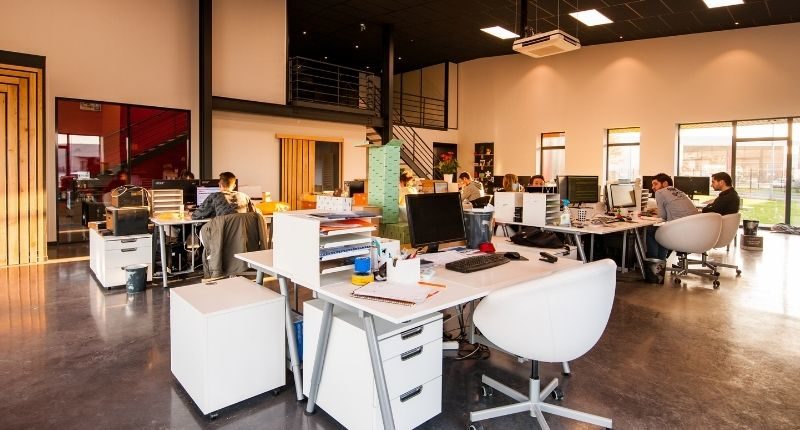- Trevor Boddy of CBRE lists five workspace trends
- Says it is a balancing act between flexibility while offering attractive workspaces
- Ultimately, businesses need to show the commute is "worth it"
As employees return to the office, there are two non-negotiables among workers – choice and flexibility.
Given this, businesses and building owners are now assessing how to entice people to return. Basically, they need to show employees it is worth the commute and hassle to come to the office, even for just a few days a week.
A recent Future of Office survey conduct by CBRE found that 83% of respondents acknowledge that workspaces foster collaboration and team productivity. 72% also said they had implemented various changes to their remote working procedures.
Therefore, it is a balancing act for companies.
Keep employees happy by providing flexibility while maintaining a culture of collaboration in-person.
These dynamic, safe and connected spaces are ones that staff should choose to come to – not because it is mandated by a company policy.
CBRE’s Senior Director of Office Leasing, Trevor Boddy, has provided an overview of the trends shaping new workspaces.
So, what are the key trends?
1. Hybrid Workspaces
Mr Boddy firstly noted that as organisations acknowledge the new work-life balance benefits, they quickly adapt accordingly.
“For instance, tech giant Atlassian has implemented its “Team Anywhere” approach and their 5,700 global staff can now elect to work from anywhere in the world, while they still push ahead with their $1.4 billion new HQ in Sydney’s Tech Central precinct,” he said.
“A great example of a company that understands how their staff value the in-office experience.”
So, how does Atlassian manage occupancy fluctuations?
Firstly, fixed desking is out while unassigned/shared seating is now. Atlassian employs space management software, desk booking systems and in-house concierge. Additionally, there are more collaborative zone and third spaces to work from.
2. Environmental Social and Governance (ESG)
ESG is becoming an important business consideration globally for many companies. In fact, for some it at the top of their corporate agenda.
Mr Boddy referred to a Business Council of Australia survey that showed around 50 of the top 200 ASX-listed companies made a Net Zero commitment last year – up by 300% on the previous year.
Along with these commitments, office buildings themselves have a role to play.
“When it comes to sustainability, age is no barrier. According to CBRE’s NABERhood Watch Report, 24% of all office buildings constructed pre-2000 now have a 5.5- or 6-Star energy ratings, and these buildings enjoy an 11% difference in occupancy when compared to their 4-Star or less counterparts,” he said.

He added that the environmental aspect is addressed partly by choosing high performing and energy-efficient buildings.
On top of this, companies are increasingly implementing policies that improve diversity, equity and inclusion. This extends to contractors and procurement relationships in many cases too.
3. The Digital Workforce
Mr Boddy believes that disruptive technology continues to be the greatest driver of business transformation. Notably, smart buildings that deliver strong digital connectivity are in high demand by tenants.
“Smart buildings are already analysing data to anticipate the needs of occupants, before they’ve arrived for the working day ahead,” he said.
“Smartphones are allowing interaction with access systems, air-conditioning and vertical transportation, while sensors are optimising operational performance.”
Additionally, there is increased investment in collaborative technology such as smart video conferencing facilities, along with smaller “Zoom rooms” and soundproof pods.
4. Wellness
Due to ever-increasing evidence highlighting the relationship between physical environments and overall health and wellbeing.
This wellness revolution has led to the WELL Building Standard, which is a mechanism that evaluates a building’s ability to enhance health, wellbeing and performance.
“Brisbane’s 25 King Street office tower was Queensland’s first building to receive a Platinum WELL Core and Shell Certification,” said Mr Broddy.
“Anchored by Aurecon, developed by Lendlease and owned by Impact Group, it’s a building that was developed with the overriding philosophy that the wellbeing of employees leads to a better employee experience and ultimately drives customer engagement and satisfaction.”
5. “Hotelisation” of the office
As the battle for talent intensifies, many businesses have simplified invested into creating the best physical spaces for employees.
“Well-connected buildings with good public transport links, excellent on-site amenity and a variety of choice in popular bars, cafes and restaurants are the pick for switched-on corporates, who are taking a leaf out of the hospitality playbook by creating curated experiences for occupants from Monday to Friday,” said Mr Broddy.
In some cases, this even includes full concierge services, morning yoga, evening wine tasting, mid-week puppy playtime and Friday BBQ’s.
“It’s about creating sustainable spaces, that foster connection through community, technology and wellbeing,” concluded Mr Broddy.








